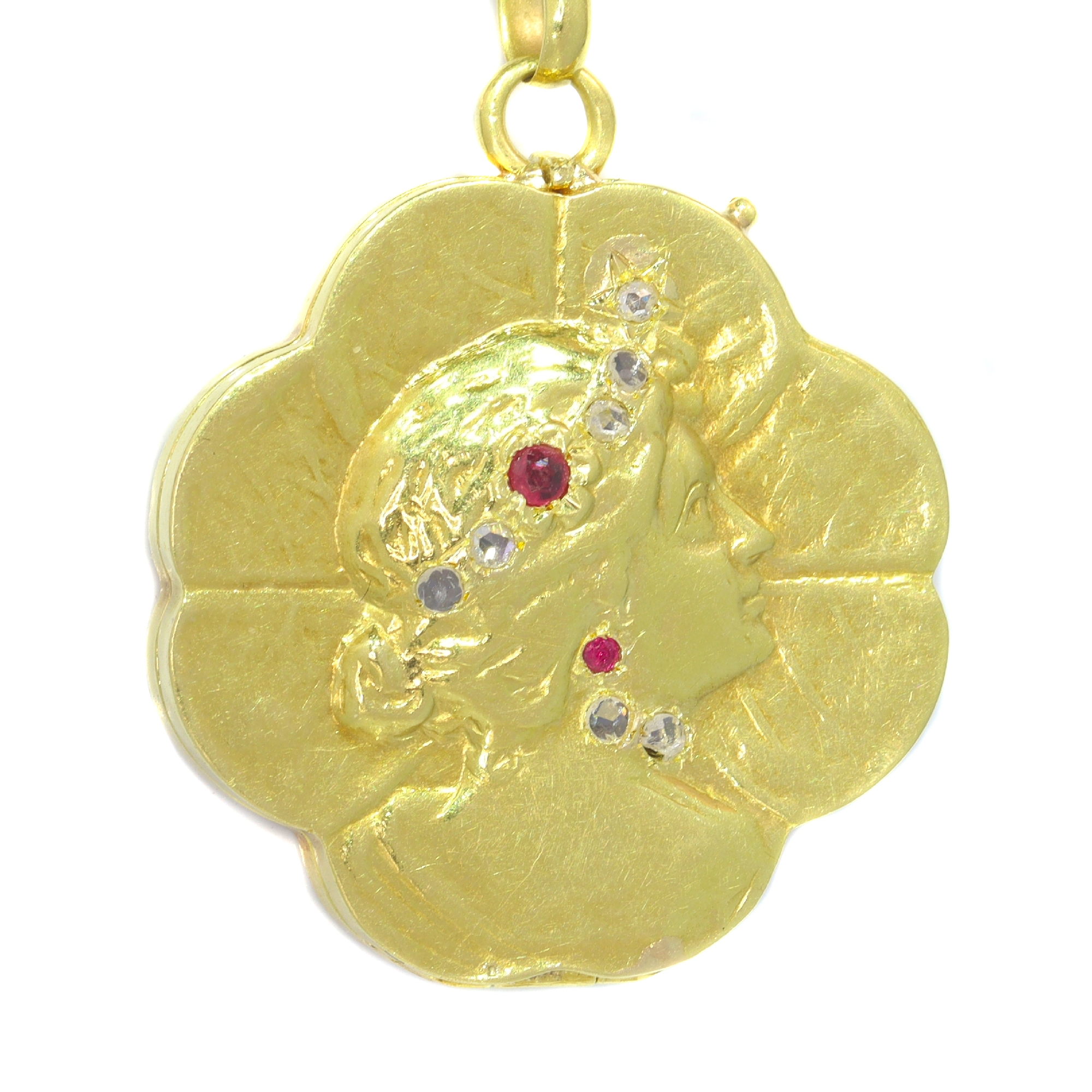We offer layaway, spread payments on the piece of your dreams. Ask us for details. Free insured shipping on all orders !!!
Vintage Art Nouveau 18K gold good luck locket set with diamonds
Antique jewelry object group
locket
Condition
very good condition
more info on our condition scale
Style
Between Victorian and Art Nouveau - Victorian decorative arts refers to the style of decorative arts during the Victorian era. The Victorian era is known for its eclectic revival and interpretation of historic styles and the introduction of
cross-cultural influences from the middle east and Asia in furniture, fittings, and Interior decoration. Victorian design is widely viewed as having indulged in a regrettable excess of ornament.
The Arts and Crafts movement, the aesthetic movement, Anglo-Japanese style, and Art Nouveau style have their beginnings in the late Victorian era. Art Nouveau (French for New Style) is an international movement and style of art, architecture and applied
ar - especially the decorative arts - that peaked in popularity at the turn of the 20th century (1890–1905).
The name "Art Nouveau" is French for "new art". It is also known as “Jugendstil”, German for "youth style", named after the magazine Jugend, which promoted it, and in Italy, Stile Liberty from the department store in London, Liberty & Co., which
popularised the style. A reaction to academic art of the 19th century, it is characterized by organic, especially floral and other plant-inspired motifs, as well as highly stylized, flowing curvilinear forms.
Art Nouveau is an approach to design according to which artists should work on everything from architecture to furniture, making art part of everyday life.
See also: late-Victorian, early Art Nouveau
,
more info on styles
Style specifics
Late Victorian / early Art Nouveau - The subject of this piece, although typical 19th Century, announces the coming of the Art Nouveau style.
Period
ca. 1900
Events & facts of this era, poetry of this era,
fashion of this era.
Source of inspiration
Good luck tokens
Theme
Ladies head in a four leaf clover - The three leaf clover became famous from around 450 AD (± 1,600 years ago) by Saint Patrick.
Because, it was said that Saint Patrick then stepped from the cathedral in Ireland on Easter morning, stooped down and picked a shamrock. He showed it to the crowd of parishioners, and then said, "This Plant represents the Father, the Son and the Holy
Spirit!" Since that time, the three leaf shamrock has become world famous! And from this time on, when clovers were made popular, the rare four-leaf clover also became popular and was considered to be lucky.
Material
18K yellow gold (touchstone tested)
more info on precious metals
Diamonds
Seven
rose cut diamonds
. We do not have the weight of the diamonds which is normal in our trade when it comes to rose cuts.
All diamonds we offer are screened by the I.J.G.C. for whether they are natural or synthetic, and all diamonds in this jewel are 100% guaranteed to be natural.
Precious stones
Two
rubies (lab produced) (also called
verneuil ruby).
Birthstones
Diamond is the birthstone (or month stone) for April
and ruby for July.
more info on birthstones
Hallmarks
No trace.
more info on hallmarks
Dimensions
height 3,80 cm (1,50 inch)
see picture with a ruler in millimeters and inches
Weight
9,20 gram (5,92 dwt)
Adin Reference Nº
22045-0089
Copyright photography
Adin, fine antique jewellery
Additional information
our latest acquisitions
jewelry glossary
wall of fame
visit us in Antwerp
subscribe to our mailinglist




